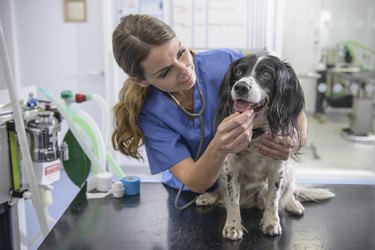The signs of a concussion in dogs can be subtle, but they can have devastating effects if not caught out and addressed. A properly treated concussion is often manageable, while an untreated one could result in residual impairments like dementia. Identifying the symptoms of a dog concussion is the first step to ensuring your dog makes a full recovery.
Dog concussions are very serious, and if left untreated can be fatal. Concussions can happen due to a dog playing aggressively with another dog or running into a hard object. This article tells you what to look out for in concussion symptoms so you can check your dog for any worrying signs.

Concussions are a major concern for dog owners. The Centers for Disease Control and Prevention estimates that approximately 1.6 million people in the United States suffer from traumatic brain injury (TBI) caused by sports-related concussions each year. And while the effects of TBI on humans are well documented, the effects of TBI on dogs are less so.
Fortunately, there are signs that can indicate your dog has suffered a concussion—and it’s important to know what they are so you can take appropriate action.
What is a Concussion?
A concussion is a type of mild traumatic brain injury (mTBI) that occurs when the head experiences rapid acceleration or deceleration. This can happen during contact sports like football or soccer, or it can happen from slipping off a skateboard or falling down stairs.
It’s important to note that concussions don’t have to be caused by contact with another person or object; even falling off your own two feet can cause enough force to the head for your dog to suffer a concussion.
Dog concussions can be difficult to diagnose and often go untreated. They can be very dangerous, so it’s important to know how to identify them.
A dog concussion is a brain injury that results in temporary or permanent impairment of physical and/or mental functions. The severity of the concussion depends on the severity of the impact, but it can be difficult to tell how severe a concussion is by looking at your dog’s behavior.
Here are some signs that your dog may have suffered a concussion:
-Loss of consciousness (up to 30 seconds)
-Disorientation
-Pupil dilation
-Headache
-Unsteady gait
Signs Of A Dog Concussion
Dogs can get concussions the same way people do. Falls from high elevations, being hit with blunt objects like a bat or swing, car accidents, running into hard objects, and head butts or kicks that result from rough play are the kinds of things that can lead to concussion. Also, small dogs with open fontanelles are particularly susceptible to concussion. Open fontanelles are openings in the skull resulting from incomplete closure of bony plates during normal puppy growth.
Most dogs lose these soft spots by ages 6 to 12 weeks. Some small breeds such as toy and tea cup breeds, American Maltese, and Chihuahuas keep these fontanelles longer, making them more susceptible to head injury. The severity of a head injury can be difficult to judge without an exam, because there might be unseen internal swelling or bleeding. Medical attention for suspected concussion is always recommended.
Signs of canine head trauma

Dog concussions are difficult to notice.
Dog concussions are difficult to notice because signs of dog concussions vary and sometimes look like other issues: rigid or flaccid limbs, abnormal level of consciousness, unusual eye movement, bleeding from nose or ears, and seizures. If your dog’s pupils look different or don’t appear to dilate, or if he has trouble standing, walking or holding his balance, he might have a concussion.
Lethargy, disorientation, paralysis, falling down, seizures, and vomiting are some additional signs of head injury that can be signs of other serious physical disorders and medical conditions — so prompt medical attention is necessary to properly assess the situation.
Treating canine head injury
Fear and pain can increase the chances of a dog going into shock. If you suspect a concussion or other head injury, keep the dog calm calm if he’s conscious, and cover him with a blanket. Signs of shock include weakness, shivering or convulsions, rapid breathing, and fast but weak pulse.
Transport your dog to the vet as quickly as possible with his head elevated above his hindquarters to reduce intracranial pressure. If your dog loses consciousness, keep him breathing by gently opening his mouth and pulling his tongue as far forward as you can to open his airway. If your dog stops breathing, perform CPR.
Impact of dog concussion
A concussion that leads to unconsciousness can be brief, or it can last several hours or even days, depending on its severity. Your vet will likely conduct physical and neurological exams to assess your dog. The method of treatment will be determined according to the factors that caused the concussion, and the resulting damage.

Treatment will be determined according to the factors that caused the concussion, and the resulting damage.
Image Credit: Monty Rakusen/Image Source/GettyImages
A concussion that leads to brain swelling can occur as late as 24 hours after an injury; it can be treated with diuretics, oxygen, and corticosteroids. Minor concussions, however, might need rest and observation, while severe cases could require surgery.